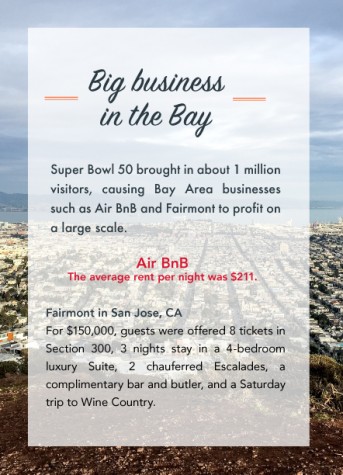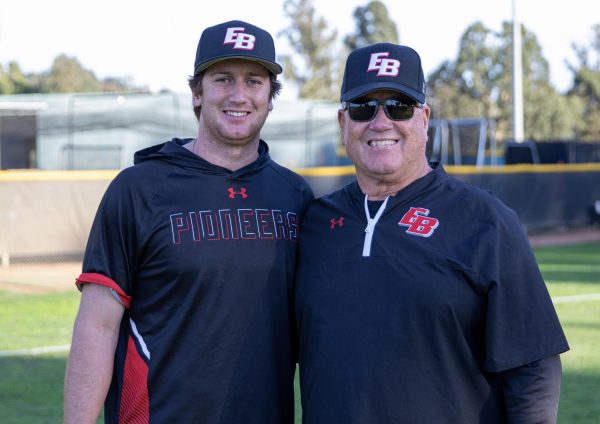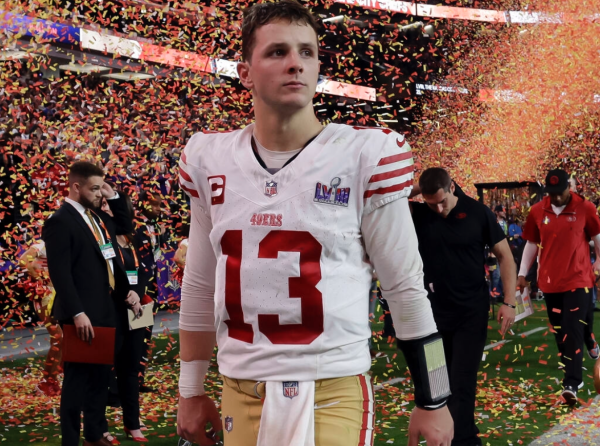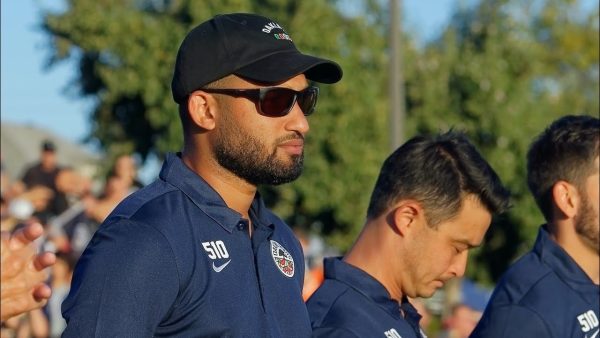Super Bowl creates big business in the Bay

The Super Bowl can be a very lucrative event for many cities: New Orleans made a profit of $480 million when the final tally came in, as reported by Mark Waller of nola.com. It allegedly saved the city from a complete financial and political collapse following Hurricane Katrina. Dallas was also reported to have made a profit of $28 million when they hosted the Super Bowl in 2011, as reported by Mike Florio.
However, the Super Bowl is not always a profitable event. In 2008, Glendale, Arizona spent millions of dollars for the hiring of security, public service agents, and on building renovations and infrastructure – expecting future tourism – but they ended up losing $1.6 million. Gluttons for punishment, the city hosted the Super Bowl again in 2015. “I totally believe we will lose money on this,” Mayor Jerry Weiers told ESPN, and Weiers was right: the city lost $2 million in 2015.
The 50th anniversary of the Super Bowl — Super Bowl 50 — was hosted in our backyard, Santa Clara. Despite the fact that some other host cities have lost money, the Bay Area stands to profit from the Super Bowl in a major way, similar to New Orleans and Dallas.
At least one million people were expected to attend the week-long festivities. San Francisco created a budget of $4.8 million to include the costs of transportation, security, municipal staff, and event space. According to San Francisco’s budget and legislative analyst, Severin Campbell, 1 million visitors would cover San Francisco’s costs of the Super Bowl if each were taxed $4.89, theoretically. These taxes come from the 8.75 percent sales tax, 14 percent hotel tax, and 25 percent tourism tax that is applied to in-city valet services.
Businesses such as AirBnB and the Fairmont stood to make a large amount due to the 1 million visitors expected to come in. “11,000 guests would be staying in roughly 4,000 listings across the Bay Area over Super Bowl weekend,” according to Tim Marcin in an article in the International Business Times, with the average AirBnB rental running at $211 a night.
For listings on AirBnB, people who rented out their aparement over the weekend were hopeful that they could have paid off a months rent or more.
For a modest $150,000, guests at the Fairmont Hotel in San Jose were offered eight tickets in Section 300, 3 nights stay in their four-bedroom Presidential Luxury Suite, 2 chauffeured Escalades to and from the game, a complimentary private bar and butler, and Saturday trip to Wine Country where there is an option between hitting the greens or getting a massage.
The Fairmont in San Francisco offered a $1 million package that included 22 tickets in a catered Gold Suite, photo ops with football legends, entry to celebrity parties, a 4 night stay for up to 6 in their penthouse suite which includes an open bar and snacks, transportation and a donation of $150,000 in the guest’s name to the 50 Fund, a Bay Area group who aims to help local children through football.
The Top 10 restaurants in San Francisco were almost completely booked throughout the weekend with handful of tables left for 2 at 5:00pm on Friday, according to OpenTable bookings. Nationally acclaimed Tony’s Pizza Napotelana offered 50 “Super Gold Pizza” which featured gold flakes, white truffles, 24 month-aged prosciutto and local mushrooms, all for $100. Servers and bartenders at popular Bay Area restaurants likely saw an increase on their weekly tip sheets.
The Super Bowl gave everyone an excuse to spend but that did not mean that every business felt a dramatic increase in volume.
“We still have people coming in for last minute reservations and we are not fully booked… We haven’t had the need for extra staff… It’s business as usual.” says Daniel Dinh, 25, an Account Manager at TownePark which operates valet and bellmen services to various hotels.
The Super Bowl was feared to bring about a myriad of traffic and commuting issues by local residents but ended up being very well coordinated by all the workers involved. Time will tell if the Super Bowl was a boost to our economy or if it was a gigantic flop. The Bay Area was a premiere destination before the game and will remain one after the NFL is packed up and gone. The event brought extra attention to Bay Area amenities and will end up being a win.







